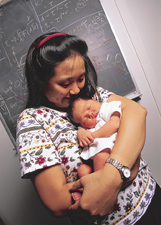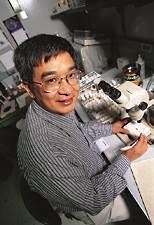 Ka
Yee Christina Lee, Chemistry
Ka
Yee Christina Lee, Chemistry
Last summer," says Ka Yee Christina Lee, an assistant professor
in chemistry, "I parked myself here to get the lab started." Lee's
lab uses X-ray and neutron scattering, as well as optical and
atomic-force microscopy, to do fundamental studies on the interactions
between lipids and proteins-interactions that, when deficient
or abnormal, can cause a variety of diseases.
 |
| Ka
Yee Christina Lee, Chemistry |
Now that the lab is going well, Lee herself has
been on the go. In early June, she gave a talk at Stanford; a
week and several conferences later, she attended a meeting on
amyloids. That talk, she explains, was related to her lab's work
on beta amyloid, a plaque-forming substance responsible for killing
the brain cells in patients with Alzheimer's disease.
In early July, after giving an invited talk at a
polymer meeting at Argonne National Laboratory, she headed to
New Hampshire for the Gordon Research Conference on Chemistry
at Interfaces. Back in town on July 6, she gave birth on July
8 to her second child and first daughter, Elizabeth-a delivery
carefully scheduled between talks.
Indeed, less than a week after Elizabeth's birth,
Lee was back in her basement office in Searle Laboratory, with
Elizabeth beside her, working on a paper for her next invited
talk, this one at the Gordon Research Conference on Complex Fluids,
to be held in Rhode Island in mid-August. Lee's paper is on lung
surfactant-a complex mixture of lipids and proteins that helps
reduce the work of breathing and whose lack can cause Respiratory
Distress Syndrome (RDS) in premature infants.
Her office chalkboard is covered with notations,
theoretical work on the physical chemistry of intersections that,
she says, is "an offshoot of the lung surfactant work."
From the Rhode Island conference, it's on to Germany
(just Elizabeth in tow; her toddler brother, Nigel, will be staying
with his grandparents in Boston) for an international conference
on organized molecular films, where she'll chair a session on
thin films.
After that, it's back to the lab-Lee has established
an exchange program with the Chinese University of Hong Kong,
and this summer, she says, "an undergraduate from their physics
department is visiting us for ten weeks to work on a biophysics
project."
Chung-I
Wu, Ecology & Evolution
Chung-I Wu, professor and chair of Ecology & Evolution,
sees summer as a special season. "In summer, you do two things,"
he says. "You try to wrap up what has been done in the last year-this
summer distinguished itself in that two post-docs, and four students
all graduated, and so we have a very large number of studies being
written up. And at the same time, the new people are arriving,
so we are planning, charting a new course."
Much of the department's work and much of this summer's
writing up centers around questions of evolutionary genetics.
One of Wu's recent studies, published in the January 20 Nature,
found that genes pertaining to male reproduction-those involved
in sperm production, transfer, and morphology-evolve much faster
than their non-sexual counterparts; it made headlines all spring.
Wu gave the paper a title, "Rapid Evolution of Male
Reproductive Genes in the Descent of Man," that pays homage to
Charles Darwin's second book, The Descent of Man, and Selection
in Relation to Sex. Darwin, says Wu, "argues that the species
could have split because of mate choice: a certain type of female
prefers a certain kind of male, another type of female prefers
another type of male." Males had to push ahead, to change in ways
that helped them win as many mates as possible, leaving more offspring
behind.
 |
|
Chung-I
Wu, Ecology & Evolution
|
The Nature study depended upon large-scale
sequence analysis of DNA sequences, not only of humans, but also
of chimpanzees and other primates. Such genome-level analyses,
Wu explains, complement the more traditional gene-by-gene approach
to the question of speciation. "It dawned on us," he says, "that
if we are really interested in the difference between humans and
chimpanzees, and if we know how to look at sequences, we might
be able to understand this differentiation by pure statistical
description-by looking at the respective DNA sequences. And to
do so we have to look at not just the sequence difference between
human and chimpanzee, we have to look at the difference between
different humans." Such number crunching, looking for statistical
patterns, is behind several other E&E studies now being completed
and submitted for publication.
Wu calls summer quarter "a time for solitude," a
respite from meetings around the country and the world. "Summer,
for me, is the time you decline to go to any meetings. You ruminate.
You think about how to put all your research and information together."
Too often, he continues, researchers "become like
concert pianists who leave no time for rehearsal. And the fun
part is actually rehearsal. Summer is a time to think, to synthesize,
and project. And, in a sense, to be incommunicado."


![]()
 Ka
Yee Christina Lee, Chemistry
Ka
Yee Christina Lee, Chemistry
